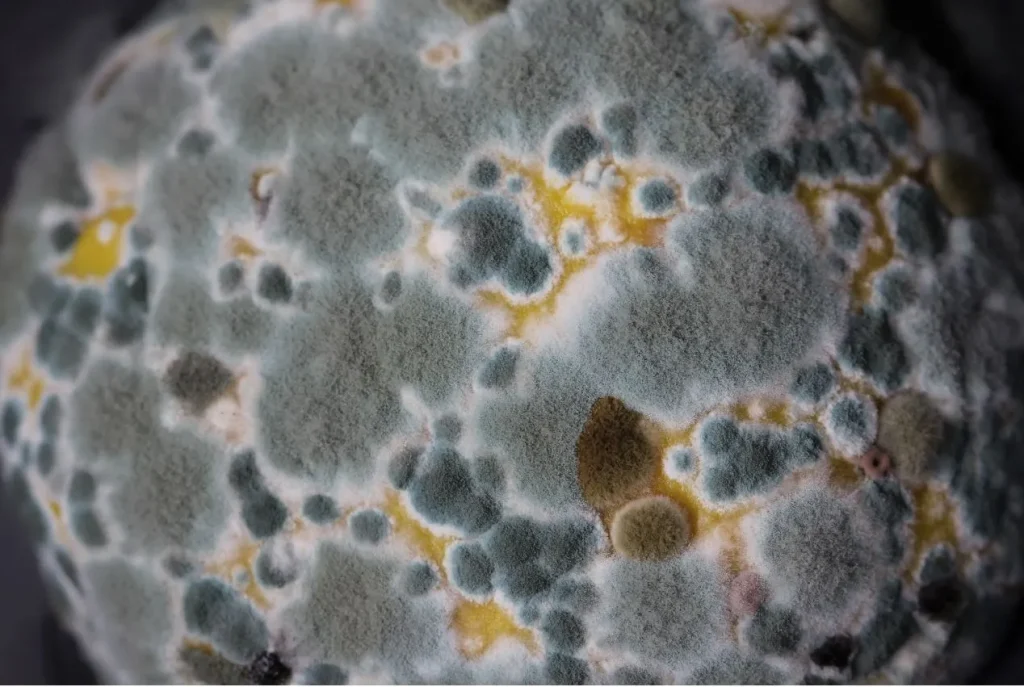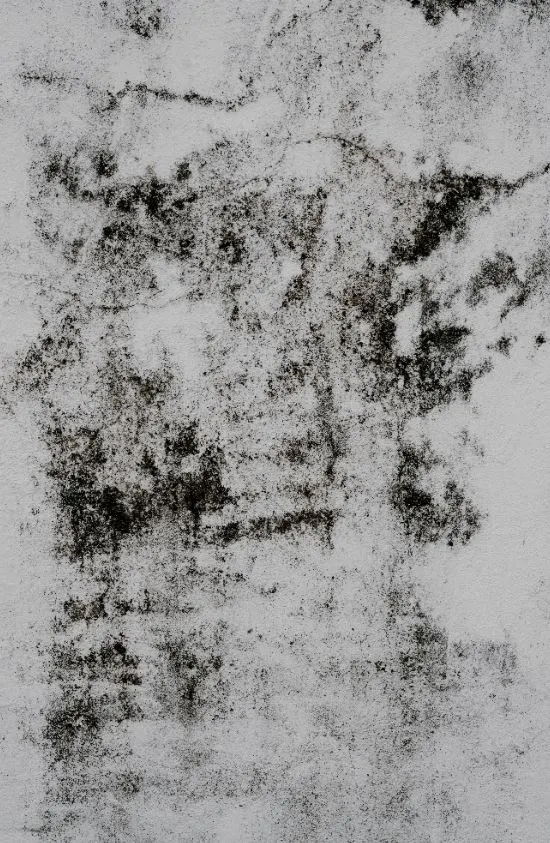As it gets closer to summertime (especially in some parts of the South), the warmer it will get, and the more the humidity will rise. This may cause moisture to accumulate and mold to start growing in your house.
With mold comes the concern most homeowners and renters have – can you get sick from mold in your house?
Yes, the mold in your house can make you sick. There are a variety of symptoms and health effects that can come from mold in your home. These symptoms and health effects from mold exposure may differ for each person.
And how sick you will get will depend on a few factors.
Before we get into these factors, let’s define what mold is, how it grows, and the different types of mold found in homes.
What Is Mold?

Mold is a fungus that reproduces through very small spores. The spores will tend to grow into mold in areas that contain a lot of moisture.
The most common indoor house molds are below:
Cladosporium
Usually grows in humid and damp areas in your home. Can appear as brown, yellow, olive green, or black.
Penicillium
Grows in damp areas or where leaks are in your home. Also very common to find on food like fruits, vegetables, bread, and cheese. Mostly blue or green but also white or yellow.
Aspergillus
Found in humid and damp areas in your home. Also found in dead leaves and compost piles that are up against your home’s foundation. Aspergillus is usually black.
Stachybotrys Chartarum
This mold is commonly referred to as black mold. It is often seen in homes after flooding has occurred. Usually dark greenish-black or black.
How Do You Know You Have Mold in Your House?
Detecting mold in your home will not be hard to do now that you know what it looks like. Another indicator of mold is that it will usually have a musty smell.
Always check areas in your home that have flooded, where water has leaked, or where moisture tends to accumulate.
This could be in areas like the bathroom, basement, laundry area, crawlspace, attic, closets, windows, or under the kitchen sink.
Now that you know the most common types of mold found in your house and where to look for it, let’s look at why mold in your home can make you sick.
What Causes You to Get Sick from Mold in Your House?
When mold releases spores (reproducing) in your house or outside, they go into the air. You can then inhale them.
Although there is usually ventilation outside, in your house, especially a room like your basement may have no ventilation.
This can cause you to inhale a larger concentration of mold spores, and this may cause you to get sick. Touching mold can also make some people sick.
There are health factors that may determine how sick you can get from mold in your house. If you have any or are any of the below, you may be more susceptible to mold sickness.
- Asthma
- Sensitivity to mold
- Allergic to mold
- Younger age group (children)
- Older age group
- Compromised immune system
- Lung or breathing problems
If you have any of these health factors, you may be wondering what kind of sickness you can get from mold.
What Kind of Sickness Can You Get from Mold?
The main kind of sickness or disease you can get from mold exposure is one of the factors mentioned earlier: asthma.
People with asthma, when exposed to mold indoors, can get asthma attacks. Indoor mold can cause childhood asthma in children.
Also, according to a study found in THE JOURNAL Of Allergy AND Clinical Immunology, there are four types of respiratory diseases you can get from the inhalation of mold spores mediated by allergic mechanisms. They are below:
- Atopic Asthma
- Hypersensitivity Pneumonitis
- Allergic Bronchopulmonary Aspergillosis (ABPA)
- Allergic Fungal Sinusitis
Although these are the diseases you could get from inhaling mold in your house, there are various symptoms of mold sickness. Let’s cover those next.
What Are the Symptoms of Mold Sickness?
Symptoms of mold sickness with the previously mentioned health factors can affect the body differently and range from headaches to eye and skin irritation.
The respiratory system is usually impacted the most and can experience:
- sneezing
- coughing
- sore throat
- congestion
- lung irritation
- wheezing
- runny nose
- asthma attack
Even if you don’t have the health factors, depending on the amount of mold in your house, you may still experience irritation of your eyes, throat, nose, skin, and lungs.
How Long Does It Take to Get Sick from Mold Exposure in Your House?
If you have any of the health factors, you may start getting sick from mold exposure as soon as you start inhaling the spores.
As mentioned earlier, the concentration of mold spores and the lack of proper ventilation in your home cause you to inhale more of them, and therefore make, you sicker faster.
How Fast Does Mold Grow?
Mold growth depends on the environment it is in and other factors. But generally, once mold spores start entering areas in your house that contain excessive moisture and the optimal conditions, mold can begin growing in 24-48 hours and become visible in 18-21 days.
How Long Does Mold Make You Sick For?
How long you are sick will depend on whether you have the health factors mentioned earlier and how long you are exposed to the mold.
Another consideration is if you have not removed all the mold from your house.
This may be because it is in a hidden area, and you are not aware of it, like the backside of the drywall in your home. Most likely you may stay sick until removed.
Can You Get Sick from Black Mold in Your House?

Black mold (Stachybotrys Chartarum) is probably the most common mold homeowners hear about or think of when they think of mold in their homes.
But black mold is just like other common molds that grow in your house, and yes it can make you sick if you have any of the health issues.
Can You Die from Mold in Your House?
Exposure to mold in your house is most likely not going to kill you if you do not have health issues. But if you have health issues, dying from mold exposure is still very uncommon.
Mycotoxicosis and Other Diseases and Symptoms
Mycotoxicosis is toxins that mold (mostly associated with black mold) may produce. It has been thought that these toxins can cause other symptoms like memory loss, fatigue, or lack of focus. And diseases such as cancer, autoimmune disease, and idiopathic pulmonary hemorrhage.
There is no evidence or link between mold and these symptoms or diseases.
Conclusion
You are probably inhaling some type of mold every day, if not in your house, outside your home, and more than likely, it isn’t making you sick.
But if you have any health factors or are in any of the age groups previously discussed, you can get sick from mold in your house.
If you have discovered excessive mold in your house, get this free guide from the EPA (Environmental Protection Agency) to find out what to do about it.
Want to learn how to kill mold? Read our article – Does Hydrogen Peroxide Kill Mold? – Learn the Easy and Safe Way to Combat Mold
Sources:
Household Molds Linked to Childhood Asthma Helen Fields
Are indoor molds causing a new disease? Abba I Terr, MD https://doi.org/10.1016/j.jaci.2003.11.014
FEMA Mold Brochure Federal Emergency Management Agency
HOW LONG DOES IT TAKE MOLD TO GROW? Richard Driscoll, cleanfax.com
Update: Pulmonary Hemorrhage/Hemosiderosis Among Infants — Cleveland, Ohio, 1993-1996, Centers for Disease Control and Prevention

